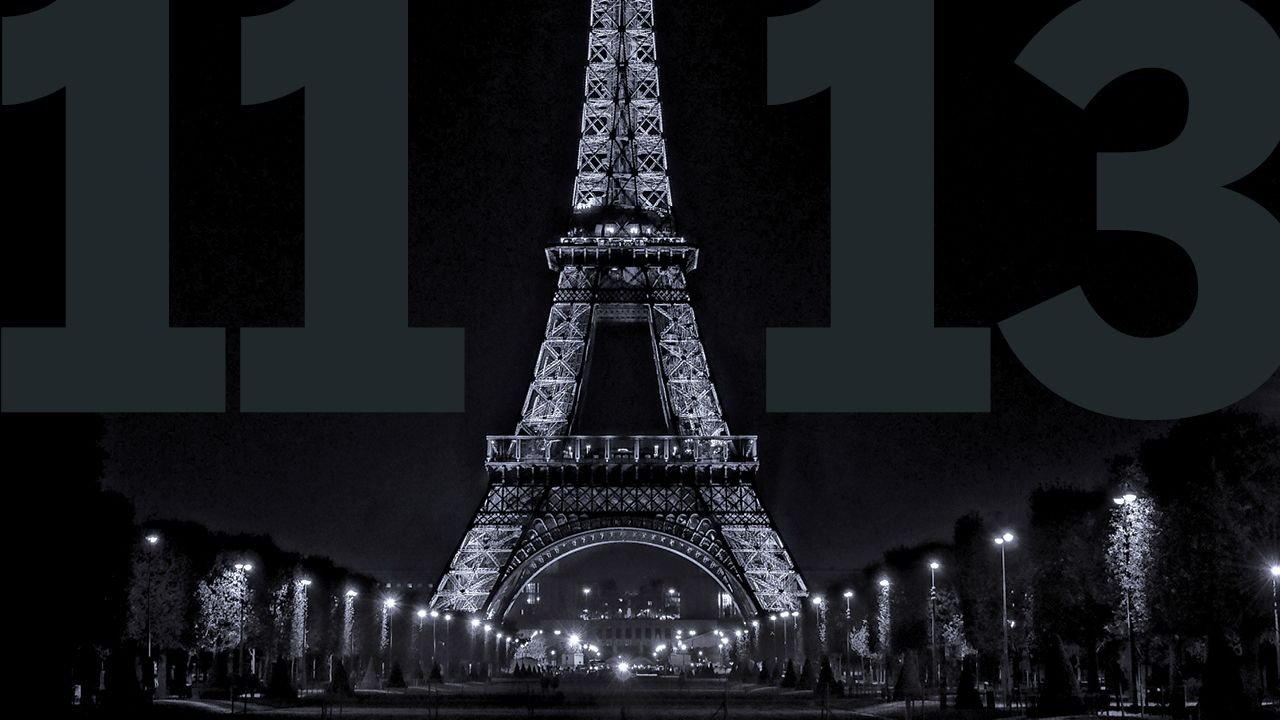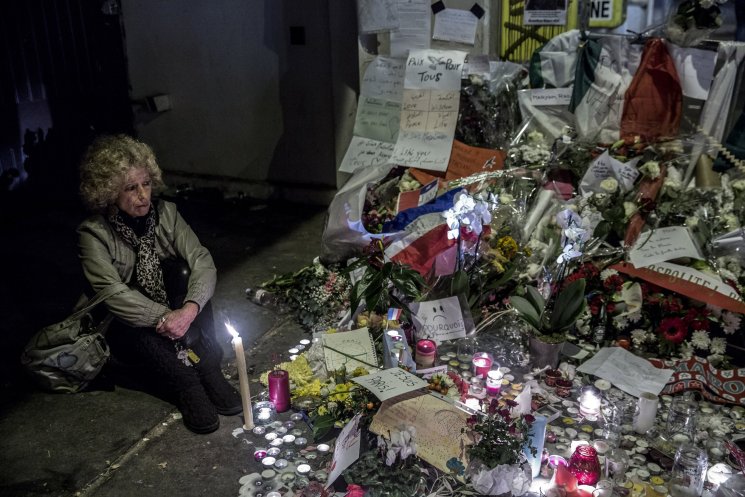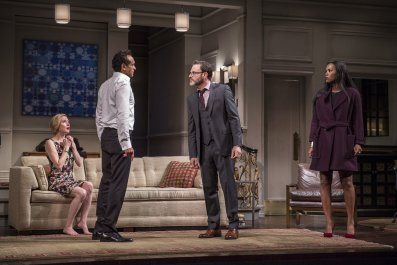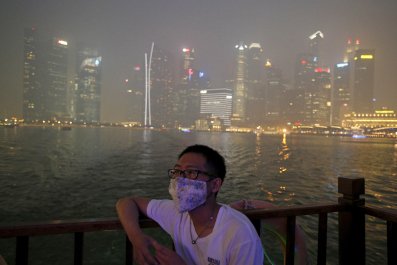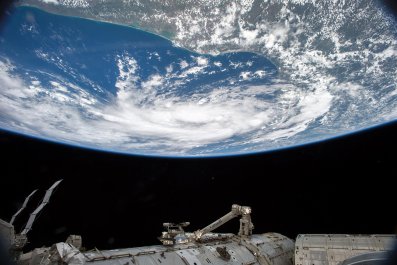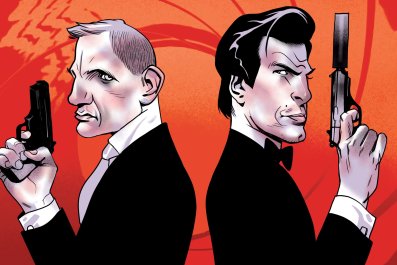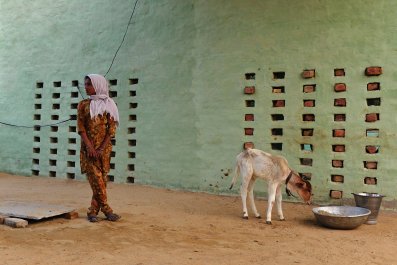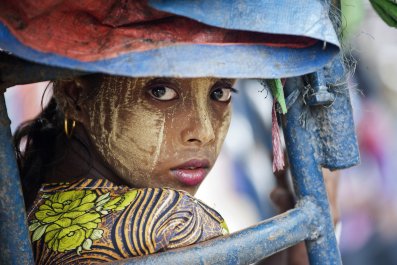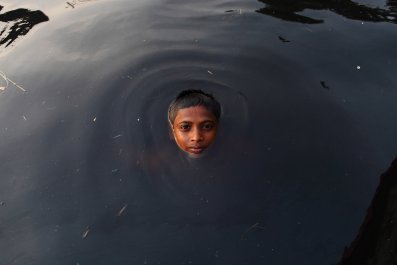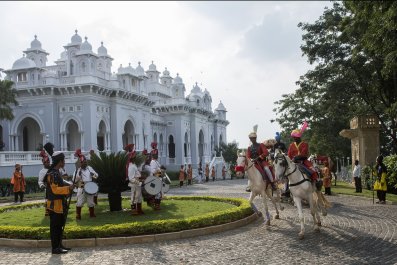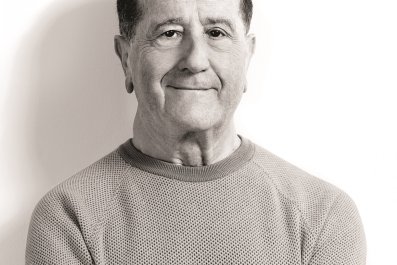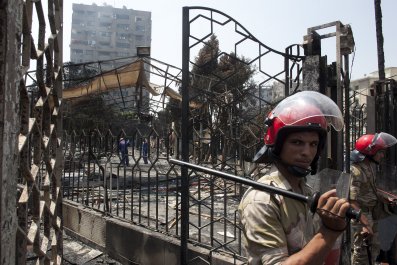September 11. Madrid. 7/7. Mumbai. And now Paris. On Friday the 13th.
Just the dates and the locations. They are the grim shorthand markers of a war whose end has never been visible; a war that will now intensify; a war that has become central to our times and may still be central for our sons and daughters.
The world was shocked by the latest attack on civilians, killing (as this is written) at least 129, with hundreds more wounded, all for the crime of being out on a Friday night in the West's most glorious city. Just eight attackers—inspired and apparently organized by the so-called Islamic State (ISIS), the radical Islamist group spawned by Al-Qaeda in Iraq—fanned out and struck. Two, wearing suicide vests, blew themselves up, killing one, outside a packed soccer stadium in northern Paris, where French President François Hollande and thousands of others were watching France play Germany. Others marched into three separate restaurants and two bars and murdered 39 people. And at the Bataclan concert hall, three gunmen methodically shot hundreds, killing 89. Two of the shooters were killed when they detonated suicide vests. Another was shot when French police stormed the venue just after midnight. At least one suspect is on the run.
The attacks, like all those that have come before over the past nearly decade and a half, were shocking and enraging. But this one, arguably, was more depressing than the rest.
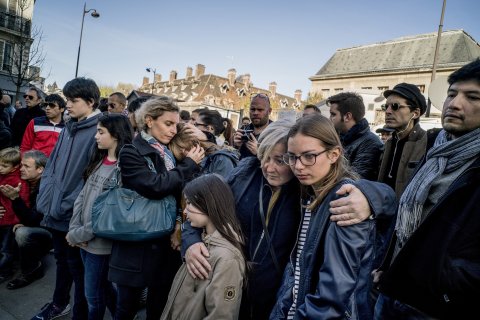
Why? Because to anyone paying attention, this attack seemed inevitable. That a major Western capital would get hit (again) was a matter of if, not when. It was a function of the growing carnage in the Middle East and Northern Africa. And it stems most directly from Syria, where well over 200,000 have been killed in a vicious, multisided civil war, one that has driven hundreds of thousands of refugees out of the country—many seeking shelter in the West.
For months, intelligence, defense and police officials in Western Europe had fretted about the likelihood that amid the refugees would be soldiers of ISIS, ready to attack. On Friday the 13th in Paris, those fears might have been realized. At least one of the gunmen might have carried a Syrian passport, possibly having traveled via Greece. If so, it was the first such attack involving a "refugee" from Syria. And it is not likely to be the last. Paris, ISIS claimed in the aftermath, "was the first of a storm." A Western intelligence official tells Newsweek, "There's no reason not to believe them."
That wasn't the only reason Paris 11/13 seemed inevitable. Intelligence officials in Europe and the United States had been vexed by the prospect of ISIS sympathizers bearing Western passports; of young Muslim men being "radicalized" by the ongoing wars in Syria, Iraq and Libya; and by ISIS's call to arms, transmitted most effectively through a sophisticated recruiting campaign on social media. Some go and fight for ISIS on its battlefields and then return to Europe. (On November 17, French authorities said the attack's mastermind was a Belgian passport holder who had fought in Syria.) Others stay behind and stew—and plot. That, apparently, was the case in Paris. Some of the attackers carried French passports, authorities say.
In the aftermath of September 11—the most spectacular and lethal of the attacks by radical jihadis—an enraged United States, backed by most of the world, immediately prepared to fight the war that had been brought to it. And in the wake of the Paris attack, Hollande called it (accurately) an act of war and vowed to be "merciless" in response. Within less than 48 hours, France had dramatically stepped up its airstrikes against ISIS targets in Syria—including one on the militant group's main stronghold, the city of Raqqa.
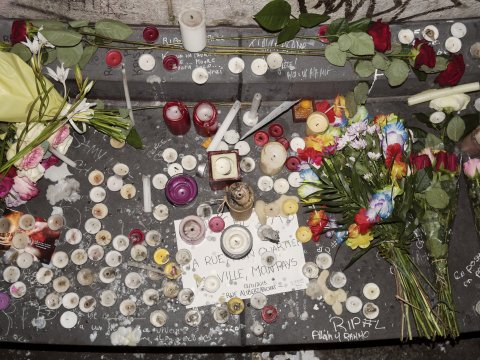
The anger in France and the West is, unmistakably, mixed with a sense of dread, for three big reasons. First, listen to those who have, for nearly 15 years, tried to come to grips with Islamist attacks explain what we need to do now: The disaffected, underemployed young Muslims of Europe, whether they are in the banlieues of Paris, the outskirts of England's Manchester or the suburbs of Amsterdam, must be brought out of the shadows. They must be made to feel part of mainstream European society rather than feeling welcome only in their local mosques. And those mosques must not be radical. If they are, they need to be de-radicalized. The same goes for mosques throughout the Islamic world: Syria, Iraq, Pakistan or Saudi Arabia. The strain of Islam that leads young men to fight must be eliminated.
Toward this end, others argue, the United States and its Western allies must once and for all insist that Saudi Arabia and the other Gulf Arab states stop allowing their citizens to fund radical Islamist groups. Western intelligence officials believe Gulf oil money helped fund Al-Qaeda going back to the late 1990s, if not earlier. Enough is enough.
Related: Every State Accepting and Refusing Syrian Refugees
Finally, much of the Islamic world must reform its educational system, clamping down on hard-line religious schools that exist to indoctrinate their students, while also helping young people prepare for the modern world and giving them something else to believe in, to strive for, other than fighting for ISIS. The war, nearly everyone agrees, cannot be won by military means alone.
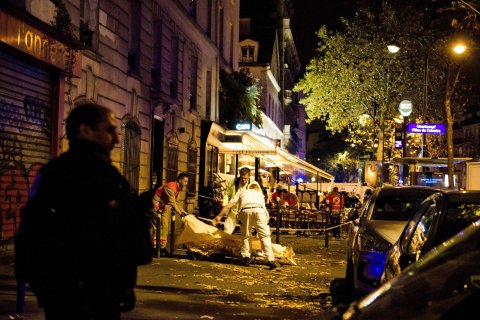
The sentiments are all fine. I ndeed, they are all true. Hardly anyone disagrees on what needs to be done. What, then, is the problem with them? Only this: The experts—the diplomats, the counterintelligence officials, the academics—were saying the exact same things in the immediate aftermath of September 11. What has happened since then? It's likely that there are more radical mosques today than there were then, both in the Islamic world and in the West. Do we know whether more—or less—money flows from the Gulf to Sunni radical groups—Al-Qaeda and its various franchises and now ISIS? The number of young people in the West and in the Islamic world attracted to jihadi groups and willing to die for them is, mercifully, a very small minority. But thousands have still traveled to Syria and Iraq to join the Islamist radicals.
The Paris attacks unfolded just as diplomats from concerned countries gathered under U.N. auspices in Vienna for the second round of talks aimed at reaching some sort of negotiated settlement to the war in Syria, the current epicenter of the broader conflict. The United States, the European Union, Iran, the Saudis, the Russians and the Turks were all there. And while, diplomats say, the carnage in Paris has for the moment concentrated minds—bringing the fight to ISIS now appears to top the world's agenda, at least rhetorically—there's little indication that this moment of unity will pave the way for a peace deal in Syria.
In many respects, little has changed. The position of the United States—and even more fervently, the French, the Sunni Arabs and the Turks—is that Syrian dictator Bashar al-Assad must go. The main goal of the rebel groups, including the so-called moderates that the U.S. has been helping, has also been to depose Assad, rather than defeating ISIS (which counts Assad among its growing list of enemies). The rebels' focus on battling Assad's forces has slowed the fight on the ground against ISIS.
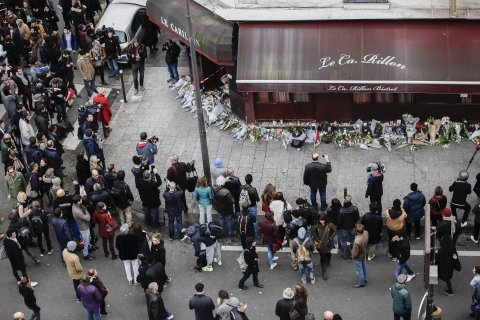
Getting rid of Assad is emphatically not the goal of two of the other major players in the conflict: Iran and Russia. Since the start of the civil war, Iran has been sending troops and matériel to help Assad. The Russian military has spent more time bombing relatively moderate rebel groups than it has spent targeting ISIS. A ccording to an analysis done by the Institute for the Study of War, only one Russian airstrike out of 14 launched between November 13 and 15 was aimed at an ISIS target. Apparently, Russian President Vladimir Putin has done enough to put Russia on ISIS's radar, however: The group claimed to have planted a bomb on the Russian airliner that crashed on October 31 while flying from the Egyptian resort town of Sharm el-Sheikh, killing all 224 people on board. Western intelligence agencies believe ISIS was indeed responsible.
In the fight against ISIS, France's Hollande now appears to be all in. The attacks have put pressure on U.S. President Barack Obama to intensify what has been at best a halting effort to, in his words, "degrade and ultimately defeat" the militant group. But is the West going to put hundreds or even thousands of boots on the ground in Syria and Iraq? Will Sunni Arab nations commit men into battle—as Washington wants—if the ultimate goal does not include getting rid of Assad? And if not, can ISIS be defeated?
Related: 'It's Important to Stay Positive': An Anxious, Unafraid Paris Returns to Work
The final reason for despair post-Paris is the inevitable impact the attack will have on European politics. In France, heading into the first round of local elections on December 6, the far-right party led by Marine Le Pen, the National Front, led in the polls. The party had been bitterly critical of what it considered the government's overly liberal immigration policies when the Pan-European refugee crisis began last summer. It has already started to use the November 13 attack—and the alleged holder of the Syrian passport—in its campaign rhetoric. Addressing the French prime minister, Manuel Valls, on November 14, National Front candidate Louis Aliot asked, "You see where the danger lies? The real danger?"
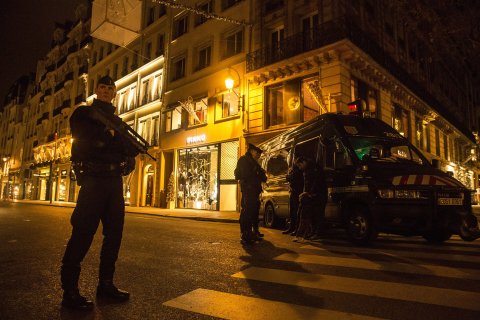
That question is equally potent next door in Germany, where Chancellor Angela Merkel has presided over an "open door" immigration policy. Berlin has waved in 760,000 refugees this year. Markus Söder, finance minister for the southern state of Bavaria, told a German weekly newspaper on November 14, "The days of unchecked immigration and illegal entry can't continue just like that. Paris changes everything."
In Poland, the government had committed to taking in 4,500 Syrian refugees. But on November 14, the incoming minister for European affairs, Konrad Szymanski, said, "We will accept refugees only if we have security guarantees." That won't happen; no country is capable of doing background checks on the hundreds of thousands of people fleeing the war in Syria.
Jean-Claude Juncker, president of the European Commission, warned on November 15 against giving in to what he called "base reactions" over the refugee crisis. Thus, anybody worried that there might be a terrorist or two tucked in among the refugees is, even in the wake of Paris, having a "base reaction." If, in fact, one of the attackers was a Syrian passport holder, the European political establishment will struggle to sell that line to unnerved citizens.
Some of those citizens—and voters—may not appreciate the lectures when their own governments have repeatedly failed to protect them. The French security services are among the most professional and adept in the world, and while Western intelligence sources say they had some inkling something was afoot, the French still missed an assault far more ambitious than the murderous attack on the satirical magazine Charlie Hebdo this past January.
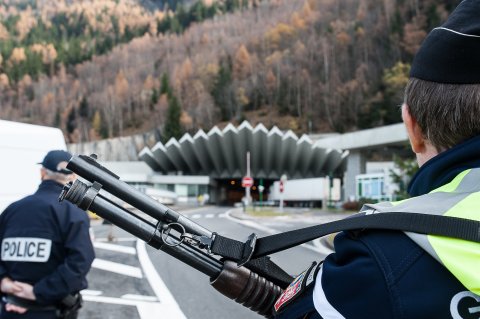
When some of the best police officers in the world fall short of stopping such a well-coordinated attack, it's safe to say that they are facing a determined, dexterous enemy that will not be defeated quickly. In the wake of September 11, many inside and outside of government warned that we were, again, in a "long twilight struggle," as we were in the Cold War. That phrase is now being recycled, as a reminder that we, the West, have fought and won long wars in the past. That this is a long war there can be no doubt, although its outcome is. And nearly a decade and half after September 11, it feels as if it's starting anew.
With Janine di Giovanni in Paris, Jeff Stein and Jonathan Broder in Washington and Lucy Kafanov in Berlin.



